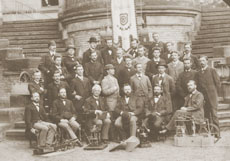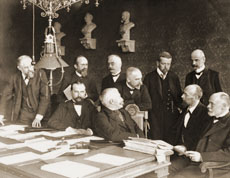


The transfer of responsibility for the institutes of technology from the Department of Trade to the Department of Education paved the way for transition from a specialised institute to a broader scientific institution. Institutes of technology did not yet possess such crucial attributes as the right to confer doctorates, which would put them on an equal footing with the universities.
The 1880s and 1890s were marked by a rapid expansion of technology and industry. The institutes of technology were faced with the problem of modifying their curriculum in order to keep pace with fast-changing technical developments in industry. The result was an expansion, differentiation and specialisation of subject matter and teaching methods. The training of engineers had to be adapted to the practical needs of industry, while a more theoretical and scientific approach was required to do justice to the increasingly academic nature of the institutes of technology. For the students, increasing specialisation and differentiation of the curriculum meant that they had up to 50 compulsory class hours per week.



The institutes of technology were faced with the task of using specific experimental methods as a basis for developing a scientific profile that would be comparable to that of the universities. At Hannover Institute of Technology, laboratories were set up as an important step towards systematic technical and scientific experiment-based teaching: from 1884 the mechanical engineer Hermann Fischer set up a Technological Laboratory for the Investigation of Fibrous Materials, and the electrical engineer Wilhelm Kohlrausch began to set up an electronics laboratory. In 1896, Franz Frese’s Machine-Engineering Laboratory was built, and further laboratories were to follow.
By the end of the 19th century the institutes of technology had created their own profile in the scientific world and had found general recognition.
On the occasion of the centenary of Berlin Institute of Technology, Kaiser Wilhelm II granted the Prussian institutes of technology the right to confer the academic degrees of Doktor-Ingenieur and Diplom-Ingenieur. This was the final step towards acquiring equal status with the universities.
On 18th August 1908 the Prussian Department of Education opened up first the universities and on 14th April 1909 also the state’s institutes of technology – Berlin, Danzig, Aachen and Hannover – to women as fully matriculated students, not without drawing attention in an additional remark that “on registration for the Diplom examination they are to have fulfilled the requirements of the examination regulations in their entirety.”








